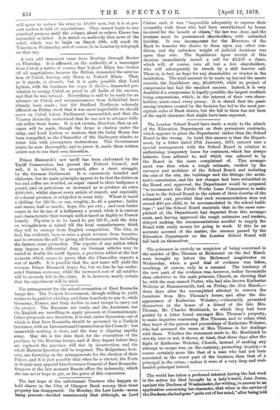Prince Bismarck's new tariff has been elaborated by the Tariff
Commission, has passed the Federal Council, and will, it is believed, be accepted, after a short struggle, by the German Parliament. It is excessively detailed and elaborate, but its main principles appear to be that the duties on tea and coffee are doubled, on sugar raised to three halfpence a pound, and on petroleum so increased as to produce an extra £600,000; whilst almost every article of import, and especially of colonial produce, is subjected to some duty. Wheat is taxed a shilling for 220 lb., or say, roughly, 20.4d. a quarter; barley and maize, half as much ; hops, 10s. per cwt.; and even butter comes in for its tax of a halfpenny a pound, while it is curious and characteristic that foreign milk is taxed as highly as French brandy. Pig-iron is to be taxed Is. per 220 lb., and the duty on wrought-iron is raised till the local manufacturers think they will be exempt from English competition. The idea, in fact, has evidently been to raise a great revenue from luxuries, and to sweeten the pill by giving all German interests, including the farmer, some protection. The exports of any nation which may impose a differential duty on German articles may be raised to double the tariff figures, a provision added at the last moment, which seems to prove that the Chancellor expects a war of tariffs. It is possible that the new taxes will yield the revenue Prince Bismarck hopes for, but we fear he has under- rated German economy, while the increased cost of all eatables will be severely felt in the cities. It is, however, nearly certain that the experiment will be tried.


































 Previous page
Previous page